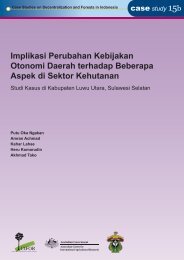Where the power lies: multiple stakeholder politics over natural ...
Where the power lies: multiple stakeholder politics over natural ...
Where the power lies: multiple stakeholder politics over natural ...
Create successful ePaper yourself
Turn your PDF publications into a flip-book with our unique Google optimized e-Paper software.
Step 1. Define <strong>the</strong> policy and legal context for management by<br />
<strong>multiple</strong> <strong>stakeholder</strong> groups<br />
Understanding <strong>the</strong> context within which <strong>stakeholder</strong>s operate is important as it explains<br />
some of <strong>the</strong> underlying issues and aspects of how <strong>the</strong>se groups function. At this stage<br />
of <strong>the</strong> analysis, one must collect enough background information to understand <strong>the</strong><br />
broader context in which most of <strong>the</strong> relations are formed. To <strong>the</strong> extent possible<br />
one must also try to appreciate <strong>the</strong> <strong>over</strong>laps, intersections and contradictions presented<br />
in <strong>multiple</strong> <strong>stakeholder</strong> groups whose members are linked to o<strong>the</strong>r levels by different<br />
types of hierarchies and chains of command. The first step in <strong>the</strong> analysis is to form<br />
some general impression of what <strong>the</strong> policy and legal framework for <strong>multiple</strong><br />
<strong>stakeholder</strong> groups is within <strong>the</strong> country, region and internationally. Fur<strong>the</strong>r, one<br />
should establish <strong>the</strong> level of experience in <strong>multiple</strong> <strong>stakeholder</strong> groups in <strong>natural</strong><br />
resources in general and specifically for <strong>the</strong> resource being managed.<br />
Question:<br />
What is <strong>the</strong> policy and legal context for <strong>multiple</strong> <strong>stakeholder</strong> groups involved in <strong>natural</strong><br />
resources management?<br />
Specific questions:<br />
1. What is <strong>the</strong> policy framework for <strong>multiple</strong> <strong>stakeholder</strong> management?<br />
2. What are <strong>the</strong> current tenure arrangements for <strong>the</strong> resource being managed?<br />
3. What are <strong>the</strong> incentives or imperatives driving management based on <strong>multiple</strong><br />
<strong>stakeholder</strong> groups?<br />
Specifically, in this section one would need to gain an understanding of <strong>the</strong> past and<br />
present systems of management. Fur<strong>the</strong>r, it is important to explore how <strong>multiple</strong><br />
<strong>stakeholder</strong> systems of management have come about. In some countries, macro<br />
and international events tend to have a profound effect on national policy. One<br />
must be aware of this possible effect and not confine <strong>the</strong>mselves within national<br />
boundaries.<br />
What to look for:<br />
1. Compare policy and actual practice. Sometimes stated intentions in policy documents<br />
bear no relation to how those policies are interpreted and applied.<br />
2. Get a sense of <strong>the</strong> extent to which local practices are controlled or determined by<br />
actions at <strong>the</strong> centre or beyond <strong>the</strong> centre. What is <strong>the</strong> locus of control?<br />
3. Determine <strong>the</strong> drivers for <strong>multiple</strong> <strong>stakeholder</strong> groups i.e. (democratisation;<br />
participation, devolution or em<strong>power</strong>ment).<br />
4. Determine whe<strong>the</strong>r <strong>the</strong>re is any previous experience of <strong>multiple</strong> <strong>stakeholder</strong> groups.<br />
Suggested Methods<br />
Literature reviews and archival searches.<br />
The review of g<strong>over</strong>nment documents and legislation will provide an <strong>over</strong>view of <strong>the</strong><br />
situation as regards <strong>natural</strong> resources management. In cases where one is dealing with<br />
systems of management financed by donors or o<strong>the</strong>r organizations, it will be necessary<br />
to review <strong>the</strong> project documents. Often, however, what is described in documents is not<br />
what one sees on <strong>the</strong> ground and sometimes <strong>the</strong> interpretations or perceptions of what<br />
<strong>the</strong> <strong>multiple</strong> <strong>stakeholder</strong> group should be or was meant to be also differ among those of<br />
particular <strong>stakeholder</strong>s involved. Opinions should be sought from wide ranging sources<br />
operating at many different levels.<br />
14

















